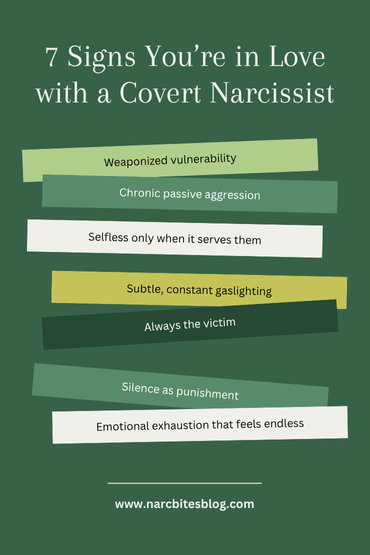Has anyone ever said to you, “I can’t believe you actually took that seriously, I was just joking”? Have they acted offended for days because you suggested something could have been done differently? Have you been ignored for an entire weekend, only for them to suddenly act warm and casual like nothing happened? Or have you noticed how their “bad day” always seems to happen right when you’re excited about something important to you? This is what life with a covert narcissist feels like.
It’s not shouting or door slamming. It’s the quiet digs, the strategic sulking, the way they turn every small criticism into a personal attack. They act wounded if you don’t respond exactly how they want, and somehow you end up being the one who feels guilty.
From the outside, they look caring, maybe even selfless. Friends might call them charming, sensitive, thoughtful. But you see another side. Do you really see it, though, or do you just feel deep down that something is wrong?
How a Covert Narcissist Weaponizes Vulnerability
Covert narcissists often seem like sensitive people who are not understood by the world. Already in the early stage of the relationship, they share very personal stories, but not to deepen the connection. They do it to trigger your sympathy, so that later they can use that sympathy against you. They present themselves as deeply wounded people who have been mistreated by others and badly treated by the whole world. With this, they condition you to be different. You should be the patient, attentive, understanding and sensitive person who will heal their wounds.
But this is not the behavior of someone who is emotionally open, who has found a person they trust, someone to whom they can reveal their deepest secrets. They are not building intimacy, they are building a bond. It is a manipulation technique. They condition you to tolerate emotional neglect, passive aggression or even cruelty because “poor them, they have been through so much.”
Building on this foundation, they create a vicious circle in your relationship. They regularly take the role of the victim to pull you as deeply as possible into their emotional games. One moment they say how much they love you and how much you mean to them, the next they collapse and blame you because you did not answer their message quickly enough. These swings are not random, they are meant to push you off balance, to make you lose yourself and “dance to their tune.”
You may also notice that their vulnerability usually appears when they feel control is slipping out of their hands. When you have had enough and start to pull away, they suddenly open up and offer you crumbs of emotional truth to pull you back. They tell you how much they love you, that you are the one, the other half of their soul. And you “happily” continue the game, because what if this time they really understood…
The Covert Narcissist’s Passive-Aggressive Patterns
A covert narcissist does not criticize you openly. They guide you with small remarks, eye rolls and quiet sighs. They might say, “I’m fine, nothing is wrong,” while their face, their tone and their whole posture tell a different story. You spend days walking around them carefully, missing the warmth they give you when everything seems fine. You keep trying to figure out what you did wrong and how to get back those calm, affectionate days.
Ambiguity is one of the foundations of covert narcissistic behavior. They keep you tense, always looking for what mistake you might have made. This is not about something you did or said. Like almost everything in a narcissist’s world, it is about control. A covert narcissist does not gain control by raising their voice. They do it by lowering your self-esteem.
When you start to see things more clearly, they change the game. Suddenly they can be loving, giving you compliments or small gifts to confuse you. You begin to doubt yourself. You wonder if they are really that bad or if you are simply overreacting.
Psychology calls this intermittent reinforcement. It creates trauma bonding and makes it hard to recognize the abuse or leave the relationship.
Over time you begin to avoid anything that might trigger their passive aggressive moods. You adapt to them. Little by little you become like a chameleon. Invisible. Even to yourself.
When a Covert Narcissist Appears Selfless – but Isn’t
They are the ones who donate, volunteer and help everyone with a smile. Friends and family can always count on them. Their unspoken rule is simple.
Give everyone what they need—attention—and then you can use them however you want.
This is not real kindness or genuine help. It is image management.
To the outside world they look caring, supportive and loving. Behind closed doors you see someone who uses generosity as a form of payment. They punish those who do not return it. One poorly timed or misplaced comment is enough for someone to lose their favor. In truth, those who are cut off might be the lucky ones.
The manipulation goes further. They often compare their efforts to yours. They say things like “After everything I have done for you” or “I gave you everything you ever wanted.” These are not words of love. They are meant to make you feel guilty and push you into obedience. Your own needs do not matter. If you express them, you are called demanding, ungrateful or selfish. The role they give you is the quiet, grateful servant who must always remember their place.
You can also see it in how they talk about others behind their backs. They often complain about how much they have done for people who never gave back the same. Only you hear this. Everyone else, the flying monkeys, are blinded by the charm they spread so easily.
Subtle Gaslighting Tactics of a Covert Narcissist
Gaslighting is meant to make you doubt your own judgment. The covert narcissist wants you to believe you see things wrong and that your perception is faulty. They often say things like “You are too sensitive,” “You are overreacting again,” or “I don’t know what you are talking about.” Sometimes they add, “I act like this because of you. You bring this out in me.”
They deny events you remember clearly. Even if you repeat every detail, who stood where, who said what, what you were wearing and what the weather was like, they look at you and say, “I don’t remember” or “Are you sure?” Over time you stop doubting them and start doubting yourself. You apologize for questioning them and even for things you never did, just to keep the peace. That is the trap.
The goal of this manipulation is not to discuss facts but to plant doubt about yourself and your reality, so their version becomes the only truth. As time goes on you begin to wonder if it is worth fighting for your truth. You notice you cannot win. Slowly you feel drained, both physically and emotionally, like a flashlight whose battery is almost empty.
They always play the victim
A covert narcissist never takes responsibility. No matter what happens they find a way to be the wronged one. If you set boundaries you are called controlling. If you ask them to keep their promises you are demanding and impossible to please.
Their mistakes are never their fault. They blame their traumatic childhood, the unfairness of the world or your unrealistic standards. This victim role is not real vulnerability. It is a way to deflect criticism and keep power in the emotional dynamic. Their emotional survival depends on being seen as the victim. They collect your mistakes and use them against you when they feel cornered. They are not looking for solutions, even if it sometimes seems that way. It is dominance disguised as being wounded.
Even when they apologize, it is only to support their version of events. A typical line is “I’m sorry, I didn’t mean it that way, but you always take things wrong.” These are not real apologies. They are just another way to twist reality.
How a Covert Narcissist Uses Silence and Distance as Punishment
Silent treatment is one of the clearest signs of a covert narcissist. If you are not yet broken or if you are persistent enough to keep talking, they will stop talking to you. Days or even weeks can pass without a word. You want to solve the problems, but as already said, they do not want solutions. They want to avoid problems while keeping control.
If you keep standing up for yourself, they punish you. They do not shout or argue. They simply refuse to speak to you. You can beg, you can yell, or you can try to ignore them the way they ignore you, but it makes no difference. They will speak again only when they decide the punishment is over or when they need something from you. When they start talking again, they act as if nothing happened. They can even be kind and charming, which serves one purpose. You will not dare to bring up the issue again once they have been “kind enough” to forgive you.
This behavior reinforces one thing. They decide when you can connect with them and when you are “too much.”
You feel emotionally exhausted
Living with a covert narcissist leaves you with the constant feeling that something is wrong, even when everything looks fine on the surface. You feel a tension inside that you cannot explain. You wake up anxious. You overthink every word and action, both theirs and yours.
Your thoughts revolve around the narcissist and your relationship. What can you do for them? How can you help them? How can you make the relationship smoother so there will be no silent treatments or blame? You do not notice that by searching for solutions for them, you are actually trying to calm your own nervous system, which is stuck in a state of constant stress.
This is when anxiety or even depressive symptoms start to appear. You begin to change. You, who once enjoyed life, who were cheerful and confident, no longer recognize yourself. The trap is that you do not even notice it happening. You are like the frog in slowly heated water, not realizing it is getting too hot until it is too late.
You lose your joy for life. Friends disappear. You neglect work and hobbies because your mind is occupied with solving a problem you did not create. In this story, you are the victim, not the perpetrator, yet you are the one most likely to go to therapy, while the one who should go never does. You are called demanding, impossible, depressed, or controlling.
And to get back the person who put you on a pedestal in the beginning, you do everything, usually at the cost of yourself. You become emotionally dependent on the rare, short-lived moments of approval.
This constant mental exhaustion is not random. It is the result of long-term emotional manipulation, meant to wear you down until you become a puppet without will, used when and how the narcissist wants.
The most dangerous part is that, like that frog in the heated water, you begin to accept this as normal. You learn to live in dysfunction. You tell yourself it is not that bad, that those moments when you glimpse the person they were at the start are worth everything.
You start behaving like an addict who will do anything to get the next dose.
The only way out is to recognize what is happening and to name it. Once you name something, you gain power over it. Then you begin to focus on yourself instead of constantly watching what the narcissist wants.




